 MyDogBreeds
MyDogBreeds Slovakian Hound is originated from Slovakia but Pembroke Welsh Corgi is originated from United Kingdom. Slovakian Hound may grow 17 cm / 7 inches higher than Pembroke Welsh Corgi. Both Slovakian Hound and Pembroke Welsh Corgi are having almost same weight. Both Slovakian Hound and Pembroke Welsh Corgi has almost same life span. Both Slovakian Hound and Pembroke Welsh Corgi has almost same litter size. Slovakian Hound requires Low maintenance. But Pembroke Welsh Corgi requires Moderate maintenance
Slovakian Hound is originated from Slovakia but Pembroke Welsh Corgi is originated from United Kingdom. Slovakian Hound may grow 17 cm / 7 inches higher than Pembroke Welsh Corgi. Both Slovakian Hound and Pembroke Welsh Corgi are having almost same weight. Both Slovakian Hound and Pembroke Welsh Corgi has almost same life span. Both Slovakian Hound and Pembroke Welsh Corgi has almost same litter size. Slovakian Hound requires Low maintenance. But Pembroke Welsh Corgi requires Moderate maintenance
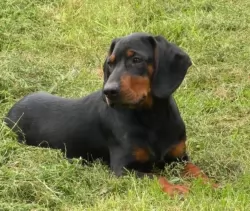 The Slovakian Hound is also known as the Slovenský Kopov or the Black Forest Hound. This is a scenthound which comes from Slovakia in Central Europe and has been bred for boar hunting.
The Slovakian Hound is also known as the Slovenský Kopov or the Black Forest Hound. This is a scenthound which comes from Slovakia in Central Europe and has been bred for boar hunting.
The breed was first recognized in the 1870s, with dogs such as the Austrian Black and Tan Hound as well as the Hungarian Greyhound being thought to be part of dogs ancestry. The breed club was established in 1988 and is recognized by the FCI.
 The Pembroke Welsh Corgi is known as an achondroplastic, a dwarf breed, and they come from Pembrokeshire in Wales. Not much is known of the dog's history but it is believed that the dogs came over with Flemish weavers who settled in Pembrokeshire way back in the 12th century already.
The Pembroke Welsh Corgi is known as an achondroplastic, a dwarf breed, and they come from Pembrokeshire in Wales. Not much is known of the dog's history but it is believed that the dogs came over with Flemish weavers who settled in Pembrokeshire way back in the 12th century already.
This dog breed has always been a cattle herding dog. Their fame has come from them being a favorite dog breed for the British royals and particularly of Queen Elizabeth II.
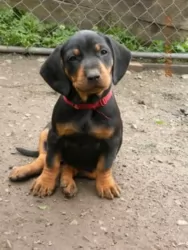 The Slovakian Hound is a muscular dog of medium height and with a long tail and long drop ears. The short coat is always black with tan markings.
The Slovakian Hound is a muscular dog of medium height and with a long tail and long drop ears. The short coat is always black with tan markings.
These compact looking dogs stand in height at about 43 to 47cm and weigh in the region of 14 to 17kg. The face is friendly and the eyes alert and bright.
Independent and intelligent, the Solvakian Hound will learn some basic commands easily. He is adaptable and will fit into life in the countryside as well as the city, so long as he is well exercised.
He is a sociable, playful dog and will do well with children, particularly if he has been trained and socialized. He is also a good choice for the first-time dog owner. He is alert and makes a good watchdog too.
 The Pembroke Welsh stands at between 25 and 30cm in height and weighs between 11 and 14kg.
The Pembroke Welsh stands at between 25 and 30cm in height and weighs between 11 and 14kg.
The coat is thick and shortish and can be fawn or a mix of colors such as white, cream, tan and black. The coat sheds quite a bit. Some of these dogs are born with their tail naturally short while others have the tail docked to give it that distinct look.
Pembroke Welsh Corgis are loving dogs and with their human families, they want to become involved with their lives. They like to please their owners and are therefore easy to train and socialize, becoming very obedient and amicable.
They’re alert, intelligent dogs and make great watchdogs too. They get on well with other pets in the home as well as children.
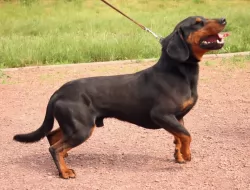 His job as a hunting dog has meant that the Slovakian Hound is a brave, energetic, determined dog.
His job as a hunting dog has meant that the Slovakian Hound is a brave, energetic, determined dog.
As a pet and companion, you won’t be disappointed as he puts as much effort into his relationships with his human family as he does with hunting.
This amicable dog makes a wonderfully loyal and devoted pet, companion and guard dog.
 British royalty has always loved the Pembroke Welsh Corgi and why not? He is loving, energetic, feisty, gentle, calm, friendly and intelligent.
British royalty has always loved the Pembroke Welsh Corgi and why not? He is loving, energetic, feisty, gentle, calm, friendly and intelligent.
Able to adapt to life in the city or the countryside, he will however need to be exercised every day as he has always been a herding- and working dog, used to working.
If you’re willing to bring the Pembroke Welsh Corgi into your home, he’ll show you what a splendid pet and companion he can be for you too.
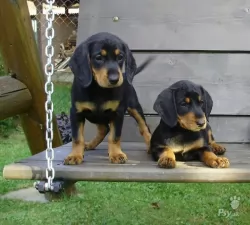 Most dogs at some or other time will be faced with a particular health challenge. Most times the veterinarian can fix these problems with the right kind of treatment.
Most dogs at some or other time will be faced with a particular health challenge. Most times the veterinarian can fix these problems with the right kind of treatment.
The Slovakian Hound is a healthy dog breed and you aren’t likely to come up with too many problems, though it it wise to be aware of some of the more common dog illnesses there are -
This is something you can expect as your Slovakian Hound ages. It is brought on by tissue degeneration. With eyes, dogs can develop cataracts. With his ears, consistently cleaning and watching out for ear infections can also help with slowing down hearing loss.
Apart from hip dysplasia which can start with even very young dogs, osteoarthritis can cause joint pain and stiffness of joints. It’s a degenerative disease, but fortunately there are a number of treatments to alleviate pain. Remember that nutrition plays a huge role in reducing joint problems in dogs.
Cancer is also a disease that has no respect for the age of the dog or dog breed. When you brush your pet, feel for any unusual lumps. Not all lumps are cancerous but it will be a good idea to have your pet checked over by the vet.
 Pembrokes can live to be between 12 to 15 years. With good care they can live to be a ripe old age, but just like with any other dog, they can become ill with any of the many common dog illnesses there are.
Pembrokes can live to be between 12 to 15 years. With good care they can live to be a ripe old age, but just like with any other dog, they can become ill with any of the many common dog illnesses there are.
Some of these diseases are hip dysplasia, monorchidism and degenerative myelopathy. Being a small or short dog, they are also prone to obesity.
This is a condition where only one testicle descends and the other isn’t able to descend into the scrotum. Both testicles should be in the scrotum by 2 months of age. Monorchidism is usually genetic and you may find your dog licking his genital area quite a bit.
If you suspect your dog has monorchidism, you will need to make an appointment with your veterinarian.
This is a progressive disease of the spinal cord and is usually seen in older dogs, starting with your dog losing coordination in the hind limbs.You’ll notice your dog dragging his feet.
As the disease progresses, the limbs weaken and the dog even has difficulty with standing. Eventually the dog is unable to walk. With time your pet even suffers with urinary and fecal incontinence. Fortunately it isn’t a painful disease but you will want to speak to your vet for advice.
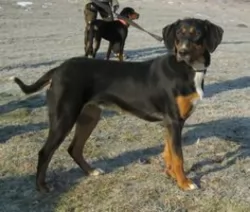 ● Like every other dog, the Slovakian Hound will need exercise if he is to remain healthy and fit. There are lots of back-yard games for dogs such as hide and seek and ball and rope games. He will also love a daily walk.
● Like every other dog, the Slovakian Hound will need exercise if he is to remain healthy and fit. There are lots of back-yard games for dogs such as hide and seek and ball and rope games. He will also love a daily walk.
● Always provide your dog with the best food there is as this encourages good health. Your Slovakian Hound requires top quality food, and while there are some good commercially manufactured foods on the market, it is important to choose the high quality ones that have natural, good ingredients in them.
Try to include some home-made food for him which can be simply mixed into the dry kibble twice a week. Boiled chicken, brown rice or pasta and spinach, sweet potatoes and carrots is super tasty and nutritious. Also try to include some raw meat into the diet occasionally as this helps with preventing skin diseases.
● Trim your Slovakian Hound's nails and check his eyes and ears for infection. The inside of the ears shouldn’t be red and the eyes should be clear and bright. If he will allow you to, check inside his mouth too to make sure there are no bad teeth.
● Don’t allow your dog to have puppies. There are so many unwanted puppies all over the world. Rather have him or her spayed or neutered to avoid puppies that nobody wants. It is beneficial for his health too.
 If you bring a puppy home, make sure he gets his puppy vaccines at 8 weeks of age.
If you bring a puppy home, make sure he gets his puppy vaccines at 8 weeks of age.
Your puppy requires 4 meals a day. Make sure to always give your pet the best quality food there is to ensure his health. Avoid giving him spicy, human food. Dogs like simple, consistent diets which don’t upset the stomach. If you buy him commercially manufactured food, buy the best quality one that isn’t full of preservatives, colorants and fillers. Try and mix in some homemade food occasionally such as chopped up boiled chicken, brown rice or pasta and some cooked vegetables such as sweet potato, spinach and carrots. A little bit of raw meat occasionally will do wonders for your pet and he will have more energy, a shinier coat, less skin allergies and less inflammation.
Always ensure your pet has a constant supply of fresh, cool water.
Brush the Pembroke Welsh Corgi’s hair twice a week. Feel for any unusual lumps while doing this. Check inside and outside his ears for ticks and fleas and ear infections.
Trim his nails.
Make sure if he goes outside that he has a shady spot to lie down in.
Exercise him. Take him on walks.
Give him your love and attention.
Take him to the vet when you can see that he is sick.
Have your dog spayed or neutered if you don’t intend for it to have puppies.